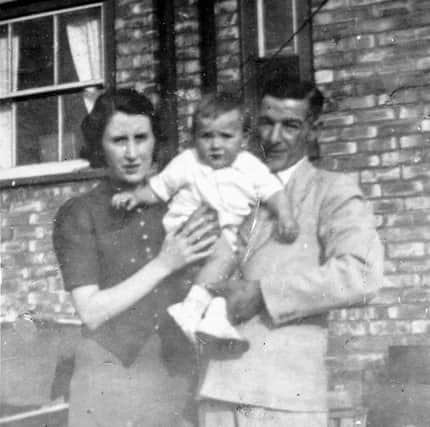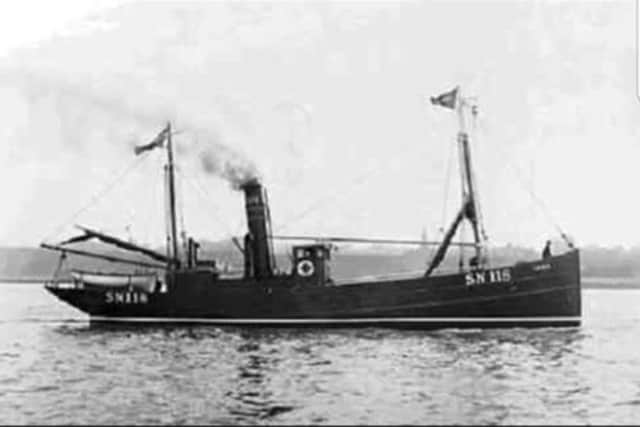Remembering the men who were lost at sea


On Tuesday, Terence Grewcock told of the fateful day 80 years ago that the trawler Jeanie Stewart left North Shields on a fishing expedition, only never to return.
On board, along with his eight fellow crewmen, was Terence’s dad Jack, from South Shields.


Advertisement
Hide AdAdvertisement
Hide AdToday, Terence remembers the men lost at sea, and the families they left behind.
“Once the Jeanie Stewart was officially ‘lost at sea’ in early January 1939, snippets of information about the crew and their families began to appear in the local press,” explained Terence, who now lives in Surrey.
“All the crew had been married, and all had young children, with the exception of Captain Fred Mills, whose daughter was grown up.
“There were nine widows and 20 dependant children. Now, in 2018, there are just five of us dependants still alive, two of them in their Nineties.”
Advertisement
Hide AdAdvertisement
Hide AdTerence said his dad, a 27-year-old deckhand, was the youngest man on board.
“Not long married, and a born and bred ‘Skyet Ender’ (slang for that old part of South Shields above the river), he was proud of his roots, and preferred to live on the south side of the river.
“But with his new responsibilities (with a family to keep), I wonder, did he ever think about working closer to home in a different job?”
Newspapers at that time reported that William Hopkins, the mate, from Hartlepool, had complained that there had been no work in the town and he was forced to travel to Tyneside to find employment.
Advertisement
Hide AdAdvertisement
Hide AdHe reported that he had had bad luck with storms, lost gear and poor catches, but thought his luck, that year, had changed for the better. Sadly, it was not to be.
“Ida Dockey was a mother of three and wife of engineer Thomas Dockey. She had suffered a different tragedy four years earlier, in 1934, when she had given birth to three stillborn triplet boys, Daglish, John and Leslie.
“Now, she walked to the Fish Quay every day for news. Prior to the tragedy, her husband would always send her a postcard from Aberdeen when the Jeanie Stewart stopped off there after a long trip. There were to be no more postcards.
“But most tragically is the story told by Vivien Maltby, the widow of the cook Henry Maltby. She said that in the early hours of Wednesday, December 14, 1938 (the day the trawler set sail from North Shields), Captain Fred Mills, skipper of the Jeanie Stewart, was faced with a problem.
Advertisement
Hide AdAdvertisement
Hide Ad“His cook had just reported too ill to join the ship for the 10-day trip.
“As a result, he decided to make an emergency request for help to the ship’s previous cook, Henry Maltby, a 28-year-old father of two-year-old son Ronald.
“Henry had recently resigned his post as cook after planning to open a fish and chip shop. He agreed to join the crew, possibly for a bit of extra Christmas money. It would be a fateful decision!”
Terence said once the loss of the Jeanie Stewart became known, “a wave of sympathy swept across the area for the plight of the dependants.
Advertisement
Hide AdAdvertisement
Hide Ad“In response, the Mayor of Tynemouth instigated the raising of a Relief Fund in January 1939, for the widows and dependants.
“It caught the imagination of the public, and was remarkably successful, considering the economic situation in the 1930s.
“When the fund was finally closed, later in year, £3,500 had been raised. Controversially, the money was not divided up among the dependants. Instead, a trust fund for ‘dependants suffering hardship’ was set up, with local trustees appointed who decided who would receive financial support – means tested of course!”
Terence said despite the generosity of local people, not everyone had the dependants at heart.
Advertisement
Hide AdAdvertisement
Hide Ad“A man from the Borders was imprisoned for a ‘scam’ whereby he took orders from householders in the Tyneside area for a delivery of kippers, with their money supposedly being donated to the fund. No kippers were delivered and no money sent to the fund. He got six months in jail.”
Yet even as the families mourned the loss of their loved ones, they would be joined in heartache by others ... many others.
“The start of the Second World War was only a month away now,” added Terence, “and very soon shipping losses would be an ever present occurrence. Seamen from Tyneside suffered in particular, and the Jeanie Stewart story was gradually forgotten.”
However, thanks to the unveiling of a memorial at Fiddler’s Green, North Shields Fish Quay, dedicated to those fishermen who have died at sea, their memories will now live on.
Advertisement
Hide AdAdvertisement
Hide AdThe final word goes to Terence who says: “By the very nature of the work: luck or its absence, plays a large part in the lives of the men who hunt fish for a living.”
It is hoped that good fortune goes with them whenever they leave shore.
Watch out for another fascinating article from local historian Dorothy Ramser – fishermen fighting the Nazis.